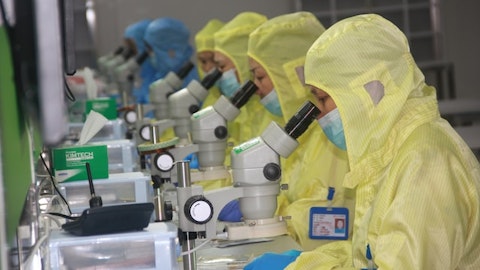Jennifer Good: So that was a teaser, that little efficacy comment. So yes, what happened at the end of the — when you finish the double blind, everybody rolled on to drug. So the placebos did have a chance to come into the study. We are, at a future meeting, going to put out the efficacy data around this, which will have skin healing data. We’ve got some pictures. We’ve got quality of life data. And as you might imagine, when you have your itch go down consistently over a year and people stay on it for a year, sort of the other measures, as you saw in our double-blind study, tend to follow. But we didn’t want to put that out at this meeting because we want to be able to do that at a future meeting.
Annabel Samimy: Okay. And are you close to an end of Phase 2 meeting now with FDA?
Jennifer Good: So as you heard, we’ve been very busy. So I would say the end of Phase 2 meeting slipped a bit where we plan to request that in the first quarter, but we want to make sure we have a full briefing document ready to go when we do that request, which will also actually drop on questions we may have even related to our cough program because the underlying molecule is the same. So we anticipate requesting a meeting in the first quarter, and it takes roughly 70 days to get a meeting from there.
Annabel Samimy: Okay. Great. Thank you.
Jennifer Good: Yeah. Thank you, Annabel.
Operator: The next question comes from Rohan Mathur from Oppenheimer. Please go ahead.
Rohan Mathur: Hey, everyone. Thanks for the update. I’m speaking for Leland Gershell. Just two questions for me. As you see Haduvio advance in IPF chronic cough, how should we think about where Haduvio will fit in the IPF patient treatment regimen? And also, could you maybe remind us if there are any differences between the results in moderate versus severe cough observed in the CANAL trial? And if so, did these data points more likely benefit in moderate and severe cough in refractory chronic cough? Thanks.
Jennifer Good: Yes. So I’ll take the first part. David, you want to comment on the second part?
David Clark: Sure.
Jennifer Good: Sounds good. So the treatment regimen, it’s interesting. I sat through a lot of calls. We did a lot of research last summer with not only patients but also treaters and payers around this exact question. And the antifibrotics, they’re challenging for patients. A lot of patients discontinue early because of a lot of the GI side effects. And the other thing we also heard is the patients, they can’t detect the fact that they’re progressing slower. I mean it’s been shown they do extend life, but they still do decline. So it’s hard for a patient to really detect the fact they’re declining slower than they would. And one of the things we heard from a lot of the investigators is because the response from our trial was so dramatic and really a difficult aspect of this disease, that a lot of these treaters would probably start actually with prescribing our drug, get a win with these patients so they’re feeling better, coughing less and then move them on — they thought they might have a better success rate of keeping patients on the antifibrotic.
So basically, what we heard is cough is present in this disease from the beginning. It stays there all the way through the end. So it was really seen as a treatment that would be used early on and continued throughout the course of the disease. And I’ll let David speak on the cough counts and why we think it could work in both moderate and severe.

